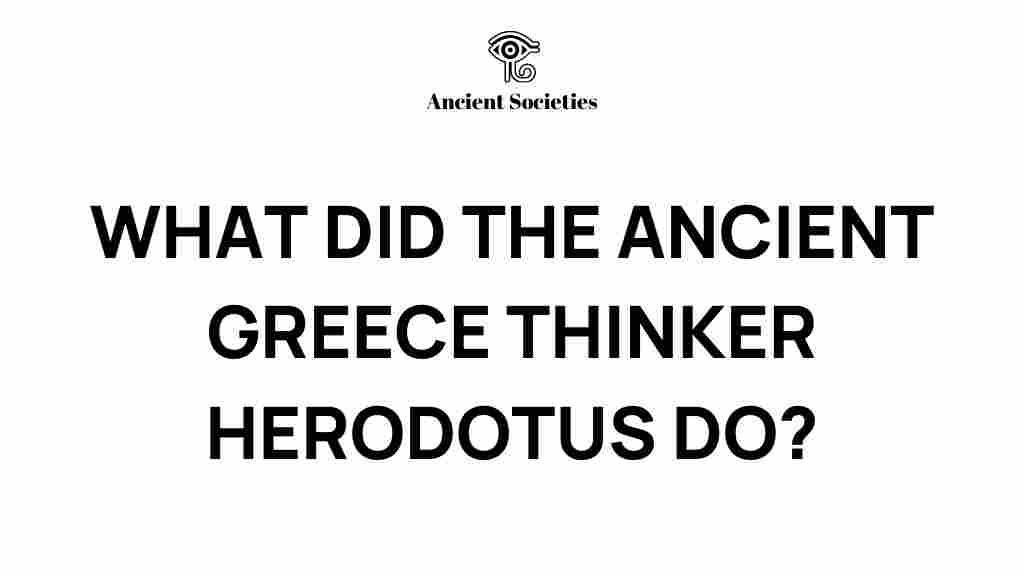Unraveling the Legacy of Herodotus: Father of History
Herodotus, often referred to as the “Father of History,” holds a significant place in the chronicles of ancient Greece and the broader spectrum of history. His pioneering work in historiography laid the foundation for how we understand and document the past. Through his intricate storytelling, Herodotus captured the essence of culture and the human experience, influencing countless scholars and historians who followed in his footsteps. This article delves into the life and works of Herodotus, examining his influence on the art of inquiry and narrative construction.
Who Was Herodotus?
Born in 484 BC in Halicarnassus, which is modern-day Bodrum, Turkey, Herodotus witnessed the rise and fall of empires, wars, and cultural exchanges that shaped the ancient world. His most notable work, “Histories,” is a comprehensive account of the Greco-Persian Wars and serves as an extensive inquiry into the customs, geography, and history of various peoples. Herodotus’ narratives not only recount events but also offer insights into the values and beliefs of different cultures.
The Importance of Inquiry in Herodotus’ Work
Herodotus approached history with a unique methodology, emphasizing inquiry or investigation. He traveled extensively, gathering information from various sources, including eyewitness accounts. This dedication to thoroughness is reflected in his writings, making him a pioneer of historical methodology.
- Firsthand Accounts: Herodotus often cited eyewitnesses, lending credibility to his narratives.
- Cultural Context: He provided context for events, exploring the customs and beliefs of different societies.
- Geographical Insight: His descriptions of lands and peoples were detailed, enhancing our understanding of the ancient world.
Herodotus and the Art of Storytelling
One of the hallmarks of Herodotus’ writing is his masterful storytelling. He wove together various narratives to create a cohesive and engaging account of history. This approach not only made his work accessible but also memorable. Key elements of his storytelling include:
- Character Development: Herodotus often portrayed historical figures with depth, emphasizing their motivations and flaws.
- Dramatic Events: He highlighted pivotal moments and battles, making history come alive for his readers.
- Interwoven Narratives: By linking different stories, he provided a broader perspective on events.
The Cultural Impact of Herodotus
Herodotus’ influence extends far beyond the realm of history; his work significantly impacted culture and the understanding of human behavior. His writings shed light on the complexities of the ancient world, revealing how different societies interacted, clashed, and coexisted. Notable cultural impacts include:
- Ethnographic Studies: Herodotus is considered one of the first ethnographers, as he explored the customs of various peoples.
- Literary Influence: His narrative style influenced subsequent writers and historians, shaping the future of literature.
- Philosophical Inquiry: His work prompted discussions about truth, morality, and the nature of history itself.
The Legacy of Herodotus in Historiography
Herodotus’ contributions to historiography are unparalleled. By establishing a systematic approach to documenting history, he set the precedent for future historians. His emphasis on fact-checking and multiple sources became a cornerstone of historical writing. The key aspects of his legacy include:
- Method of Inquiry: Herodotus encouraged a critical approach to historical research, emphasizing the need for evidence.
- Integration of Stories: He demonstrated how narratives could enrich historical accounts, providing context and depth.
- Understanding of Bias: Herodotus acknowledged his biases and the limitations of his sources, inviting readers to question and analyze.
Herodotus’ Influence on Modern Scholars
Modern scholars continue to draw from Herodotus’ works, utilizing his methodologies and insights in their research. His influence can be seen in various fields, such as:
- History: Contemporary historians often reference Herodotus to underscore the importance of comprehensive research.
- Literature: Writers look to his narrative techniques to enhance their storytelling.
- Anthropology: Ethnographers study his accounts to better understand ancient cultures and their interactions.
Challenges in Interpreting Herodotus
While Herodotus is revered as the “Father of History,” interpreting his work presents challenges. Some historians argue that:
- Subjectivity: Herodotus’ personal biases can influence his narratives.
- Myth vs. Reality: Some of his accounts blur the lines between factual history and mythological storytelling.
- Historical Accuracy: Certain events may be exaggerated or misrepresented, leading to debates about their authenticity.
Herodotus’ Enduring Relevance Today
Despite the challenges in interpretation, Herodotus’ work remains relevant in today’s world. His emphasis on inquiry and narratives resonates in a society that values storytelling as a means of understanding complex issues. Consider the following:
- Documentaries and Media: Modern documentaries often echo Herodotus’ style by blending storytelling with factual accounts.
- Historical Novels: Authors frequently draw inspiration from Herodotus’ narrative techniques to create engaging historical fiction.
- Cultural Studies: Scholars examine how Herodotus’ observations can inform contemporary discussions on culture and identity.
Engaging with Herodotus’ Work
For those interested in exploring Herodotus further, several resources are available. A great starting point is reading his work, “Histories,” which is accessible in various translations. Additionally, various academic articles and books analyze his contributions to historiography and storytelling.
For an in-depth study of Herodotus, consider visiting this History Channel article that provides a comprehensive overview of his life and works.
Conclusion
Herodotus’ legacy as the “Father of History” is firmly established through his groundbreaking work in historiography and the art of storytelling. His inquisitive nature, dedication to cultural understanding, and ability to weave engaging narratives have left an indelible mark on history and literature. As we continue to study and analyze his contributions, we are reminded of the importance of inquiry and the power of stories in shaping our understanding of the past. Herodotus remains a beacon for scholars and enthusiasts alike, guiding us in our pursuit of knowledge and understanding of the intricate tapestry of human history.
This article is in the category History and created by AncientSocieties Team
